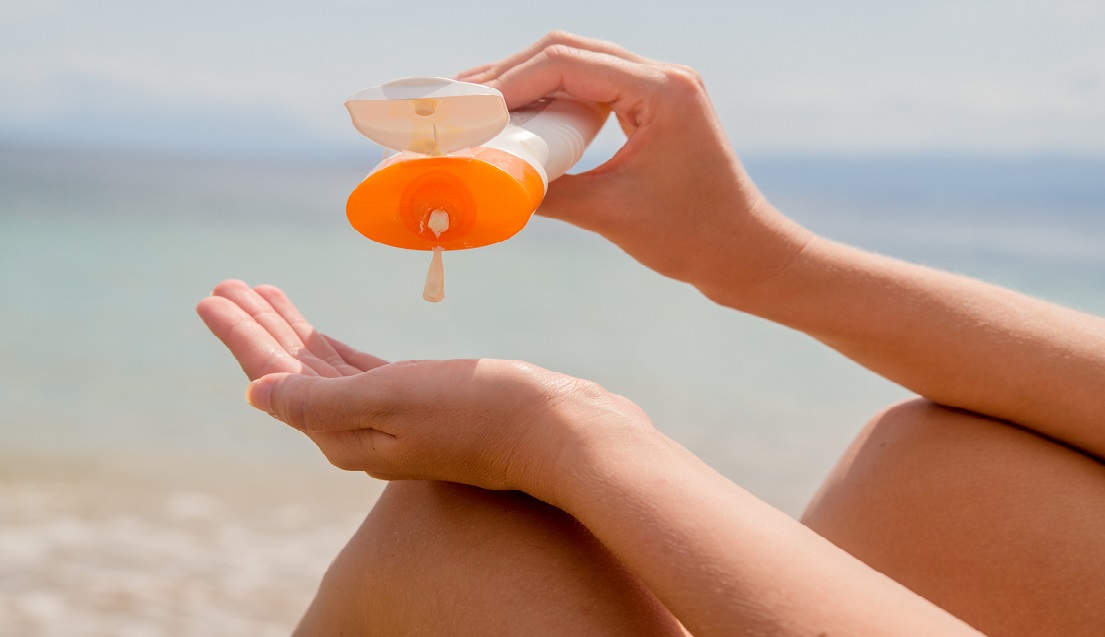Mineral Vs Chemical Sunscreens - What Works For Your Skin?
Explore the differences between mineral and chemical sunscreens to find the ideal protection for your skin. Choose the right sunscreen for your unique needs with our comprehensive guide on mineral vs. chemical sunscreens.
Author:Katharine TateReviewer:Karan EmeryFeb 21, 20244.2K Shares81.2K Views

It's possible that you already know how important sunscreen is for your skin. Sunscreen keeps you from getting too much of the sun's harmful rays, which can cause fine lines and wrinkles, early signs of age, and even skin cancer.
The chance of nonmelanoma skin cancer and melanoma, the most dangerous type of skin cancer, has been shown to go down when you use a broad-spectrum (UVA and UVB) sunscreen every day. But is it mineral vs chemical sunscreens,you need to think about when picking out sunscreen?
Who Should Use Sunscreen?
Sunscreen is essential for everyone, regardless of age, gender, skin type, or skin tone. The sun's ultraviolet radiation (UVR) poses significant damage to the skin, being a primary contributor to skin cancer, precancerous lesions, premature aging, wrinkles, and dark spots. UV radiation can penetrate unprotected skin, causing damage at the DNA and cellular levels, leading to visible negative effects.
The American Academy of Dermatology emphasizes the importance of sunscreen, stating that the right sunscreen plays a crucial role in protecting against sunburn, skin cancer, and signs of premature skin aging, such as sun spots and wrinkles. Therefore, incorporating sunscreen into your skincare routine is vital for overall skin health and protection against the harmful effects of sun exposure.
What Is Mineral Sunscreen?
Mineral sunscreen, also known as physical sunscreen, is a type of sun protection that uses mineral-based UV filters to block and reflect the sun's rays from the skin's surface. The two most common minerals used as UV filters in these sunscreens are titanium dioxide and zinc oxide. Unlike chemical sunscreens, which absorb and chemically react with UV rays, mineral sunscreens create a physical barrier that sits on top of the skin, providing a reflective shield.
Here are some key points regarding mineral sunscreen:
Pros Of Mineral Sunscreen
- Safe for Sensitive Skin -The active ingredients in mineral sunscreens, particularly zinc oxide and titanium dioxide, are generally well-tolerated by individuals with sensitive skin.
- Suited for Acne-Prone Skin -Mineral sunscreens are often non-comedogenic and less likely to cause inflammation, making them suitable for people with acne-prone skin. Zinc oxide, in particular, may even have potential benefits for improving acne.
- Potentially More Effective Sun Protection -Some dermatologists consider mineral sunscreens more effective than chemical sunscreens because they create a physical barrier that prevents UV rays from penetrating the skin. However, more research is needed to fully confirm this perspective.
Cons Of Mineral Sunscreen
- Undesirable Texture -Mineral sunscreens have been associated with a thick and sometimes goopy texture, which may not be as pleasant to wear, especially under makeup. However, advancements in formulations have led to the development of lighter and more cosmetically elegant mineral sunscreens.
- White Cast -Traditional mineral sunscreens could leave a white cast on the skin, especially for individuals with deeper skin tones. Modern formulations often include innovations such as slight tinting to mitigate the white cast, making them more suitable for a variety of skin tones.
What Is Chemical Sunscreen?
Chemical sunscreen, also known as organic sunscreen, relies on approved UV filters that absorb and transform UV rays into heat when they are absorbed into the skin. Chemical sunscreens utilize UV filters such as oxybenzone, avobenzone, and octinoxate, which work by absorbing UV rays and converting them into heat.
Chemical sunscreens are often clear, gel-like formulas that do not leave a white cast on the skin. They are generally more sheer and are favored by consumers for their lightweight feel.
Pros Of Chemical Sunscreen
- Clear and Sheer -Chemical sunscreens are known for their clear and gel-like formulations, providing a transparent finish on the skin without leaving a white cast.
- Spreadable and Enjoyable -Chemical sunscreens have seen more innovations in terms of texture. They often feature lightweight, gel-like, or spray-on formulas that are easy to blend and enjoyable to wear, both with and without makeup. Some formulations even offer additional benefits, such as enhancing the skin's glow.
Con Of Chemical Sunscreen
- Potentially Less Effective -Some dermatologists consider chemical sunscreens to be slightly less effective than mineral formulas because they absorb, rather than physically block, UV rays. Nevertheless, the most effective sunscreen is the one that individuals are willing to use consistently.
- Environmental Impact -Certain ingredients commonly found in chemical sunscreens, such as oxybenzone, may have adverse effects on the environment and are not considered "reef-safe" in some states. Further research is needed to fully understand the impact of sunscreen on oceans and reefs.
- Recalls - While chemical sunscreens are generally considered safe, there have been recalls associated with some formulations in the past. However, it's crucial to note that these recalls are isolated incidents, and overall, chemical sunscreens are endorsed as a safe option by board-certified dermatologists.
What's The Difference Between Mineral Vs. Chemical Sunscreen
Mineral Sunscreen Reflects UV Rays
Mineral sunscreen operates by reflecting UV rays away from the skin's surface. The primary distinction between mineral, or physical, sunscreens and chemical sunscreens lies in their approach to handling sunlight. Mineral sunscreens contain active ingredients like titanium dioxide and zinc oxide, forming a protective layer on the skin that reflects UV light rather than being absorbed.
In contrast to chemical sunscreens, mineral sunscreens do not penetrate the skin. If someone wearing mineral sunscreen is photographed with a flash, the product on the skin may visibly reflect the flash. Mineral sunscreens are easily identifiable by their chalky, white appearance, serving as a visual cue for reapplication.
With mineral sunscreens, the adage holds: if you can still see it, it's still working. These products should be reapplied approximately every two hours, especially after swimming or sweating. For those who find the traditional chalky look unappealing, tinted options are available, offering the same mineral protection with added color to blend seamlessly with various skin tones.
Chemical Sunscreen Absorbs UV Rays
Chemical sunscreens are chosen by many due to their smoother texture, even though they may not be as effective. Chemical sunscreens absorb UV rays by altering their chemical structure to minimize sun damage.
Common active ingredients in chemical sunscreens include oxybenzone, octinoxate, cinoxate, dioxybenzone, ensulizole, homosalate, meradimate, octisalate, octocrylene, padimate O, sulisobenzone, and avobenzone, available in both cream and spray formulations.
However, chemical sunscreens wear off more quickly and necessitate reapplication every few hours. While spray sunscreens may offer convenience, there is a risk of missing spots on the skin compared to cream sunscreens. In humid conditions or during activities like swimming, the need for more frequent reapplication arises, as sweat and water can expedite the removal of chemical sunscreens.
Acneic Or Sensitive Skin - Use Mineral SPF
It's essential to be mindful of your skin type when selecting sunscreen. Breakoutsassociated with sunscreen use can be attributed to either pore occlusion from comedogenic materials or sensitivity reactions to chemical UV-blocking ingredients.
To address this, it is advisable to prioritize physical sunscreens over chemical formulations, especially for individuals with acne-prone or sensitive skin. Look for labels indicating oil-free or non-comedogenic options to ensure compatibility with your skin type. This proactive approach can help minimize the risk of skin reactions and promote a healthier complexion.
Deep Skin Tones - May Prefer Chemical SPF
Finding a physical sunscreen that complements deeper skin tones without creating a pasty appearance can be a challenge. Chemical sunscreens are often more convenient in this regard, offering an easier solution. However, it's worth noting that tinted physical sunscreens also exist and can effectively address this issue.
Acknowledging that while there are mineral options that blend well with deep skin tones, opting for a chemical formula might be more straightforward and cost-effective.
Traditionally, mineral sunscreens have faced challenges in providing an elegant finish, particularly for individuals with brown and black skin. The emergence of breakthrough products that offer physical SPF protection for darker skin tones without leaving a white or iridescent cast represents a noteworthy innovation. Once you discover the ideal physical sunscreen that suits your skin tone, the need for chemical alternatives may diminish.
Other Types Of Sun Protection
Skin cancer diagnoses in the United States outnumber those of all other cancer types combined, underscoring the critical importance of daily sun protection. This necessity extends beyond sunny days and transcends seasons, emphasizing the need for vigilant care, even in winter or on cloudy days when UV rays are still present. While sunscreen remains a key player in safeguarding your skin, there are additional measures to enhance sun protection:
- Clothing -Invest in sun-protective clothing, or simply opt for long-sleeved tops and pants with a tight-knit fabric. Donning a wide-brimmed hat can also provide valuable coverage for your face and neck, ensuring a comprehensive shield against harmful UV rays.
- Timing -Be mindful of peak sunshine hours, typically occurring between 10 a.m. and 4 p.m. Whenever possible, plan outdoor activities before or after this period and seek refuge in the shade to minimize direct sun exposure during these high-intensity hours.
- Avoid UV Lights -Extend your sun protection regimen by steering clear of artificial UV sources, including tanning beds and sunlamps. These lights can contribute to skin damage and increase the risk of skin cancer, making their avoidance an integral part of comprehensive sun safety.
Frequently Asked Questions
Which Is Better Mineral Or Chemical Sunscreen?
Mineral sunscreens are usually the better and healthy choice between the two. Ploch says, "I tell my patients that mineral sunscreens are like a healthy, home-cooked meal, [while] chemical sunscreens are like the fast food of sunscreens."
Do Dermatologists Recommend Mineral Or Chemical Sunscreen?
The physician Dr. Dendy Engelman says that neither mineral sunscreen nor chemical sunscreen is perfect. That's why she tells her patients to get both kinds. “My main focus is to prevent sun damage that could turn into cancer or another fatal disease,”she says.
Which Is Better Physical Or Chemical Sunscreen?
Chemical sunscreens tend to be better at keeping out water and sweat. You might want to choose a chemical sunscreen over a physical one if you work out a lot and sweat a lot or spend a lot of time in the water.
Should Oily Skin Use Mineral Or Chemical Sunscreen?
Mineral-based sunscreens are great because they are gentle and don't irritate the skin as much, which makes them perfect for people with oily skin. They are less likely to irritate the skin or cause acne because they sit on top of it instead of being swallowed.
Final Thoughts
The choice between mineral and chemical sunscreens ultimately depends on individual preferences, skin types, and specific needs. Both types provide effective protection against harmful UV rays, and the key is to select a sunscreen that aligns with your skin's unique characteristics and personal preferences. Regular use of sunscreen, regardless of type, remains a crucial step in safeguarding skin health and preventing sun-related damage.

Katharine Tate
Author

Karan Emery
Reviewer
Latest Articles
Popular Articles


